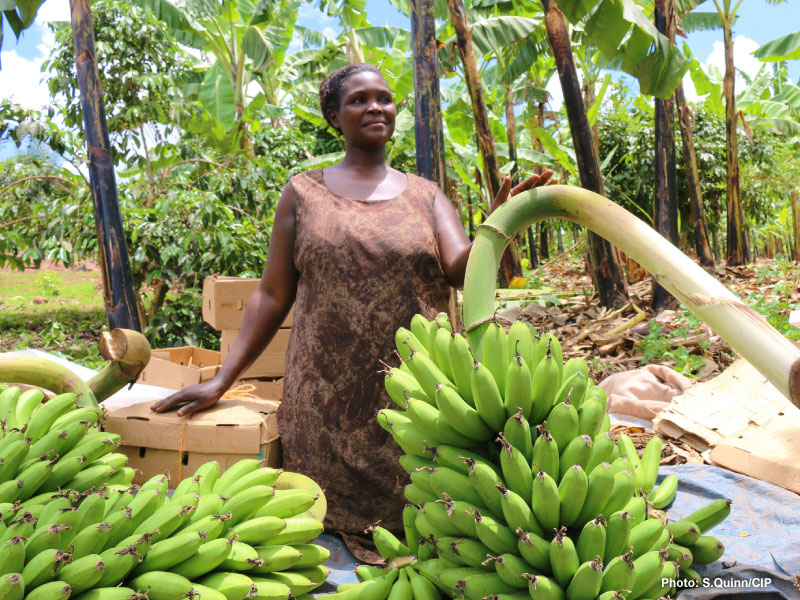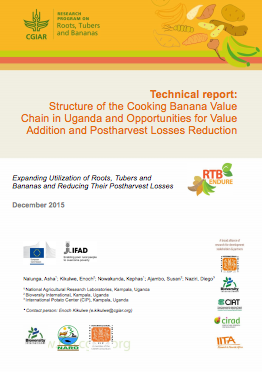Banana value chain innovations create income opportunities for farmers and retailers

RTB is working with local partners along the entire cooking banana value chain in Uganda – from the farm to the market – testing strategies to reduce postharvest loss and differentiate products in order to improve incomes and food security.
Cooking banana is the main staple crop in Uganda, grown mostly by smallholders who eat about 60% of production and sell about 40%. The crop is an important source of income for farmers and other value chain actors, but a significant portion of cooking banana production is lost or damaged due to the fruit’s short shelf life and poor handling.
A team of researchers from Bioversity, CIRAD, IITA and Uganda’s National Agricultural Research Organization (NARO) is working with farmers, transporters, vendors and exporters in Central and Western Uganda on ways to reduce loss and increase the earnings of smallholders and cooking banana sellers – most of who are women. The collaboration is one of four subprojects under ‘Expanding Utilization of RTB and Reducing Their Postharvest Losses’ (RTB-ENDURE), a three-year (2014-2016) initiative working with banana, cassava, potato and sweetpotato in Uganda, funded by the European Union and the International Fund for Agricultural Development.
According to Diego Naziri, value chain expert and RTB-ENDURE project coordinator, the cooking banana research team has worked with farmers and transporters to decrease postharvest loss while testing ways for retailers to increase their earnings from cooking banana. He noted that a 2015 market study showed that women are disproportionately affected by postharvest loss, because they are largely responsible for retailing the crop and frequently have to sell damaged bananas for low prices. He added that women vendors earn smaller margins than middlemen and transporters.
Because losses are highest during peak harvest, when the banana supply surpasses demand, RTB researchers are testing staggered planting systems, with 266 farmers trained in staggered planting in 2015. They also identified cooking banana varieties that produce robust fruit with a longer shelf life that is less susceptible to damage. Although there is market demand for these kinds of varieties, few farmers grow them. The RTB-ENDURE banana team worked with smallholders to select four such varieties for planting and provided training in macro-propagation of planting material and better agronomic practices to boost farm production.
Bioversity researcher Enoch Kikulwe, the banana subproject coordinator, explained that farmer groups built macro-propagation chambers where clean planting material for the selected varieties provided by NARO is multiplied for distribution to smallholders. He cited the example of a group of women in Lwakalolo Parish, in Ddwaniro Sub-County, who also use their macro-propagation chamber for training other farmers. Researchers also helped farmers establish 10 mother gardens – four of which are managed by women – where they grow the new varieties. At the same time, CIRAD researcher Christophe Bugaud is trying to determine the best harvesting times for desired postharvest properties, combining sums concept, potential storage and sensory evaluation of fruit.
RTB researchers are also testing ways to increase retail margins by diversifying the way cooking bananas are sold, such as by breaking bunches into smaller units (clusters, fingers or peeled bananas) that are sorted, graded, and labeled by cultivar. The banana team provided business training to two women who recently moved into wholesale – an activity dominated by men – and helped them gain access to credit, markets in Kampala and banana exporters as part of a strategy to promote women’s participation in market-chain links with higher margins.
“When value chains improve, men often supplant women, but we’re trying to avoid this,” said Naziri, who added that gender was integrated into the participatory market chain approach used for all subprojects.
Kikulwe explained that the women the project has helped move into wholesale will purchase the bananas with longer shelf life from participating farmers, which should improve smallholder incomes while reducing the risk of fruit loss for the wholesalers and vendors they sell to. This and other innovations facilitated by RTB-ENDURE have the potential to be scaled out within Uganda and beyond.
Related links


